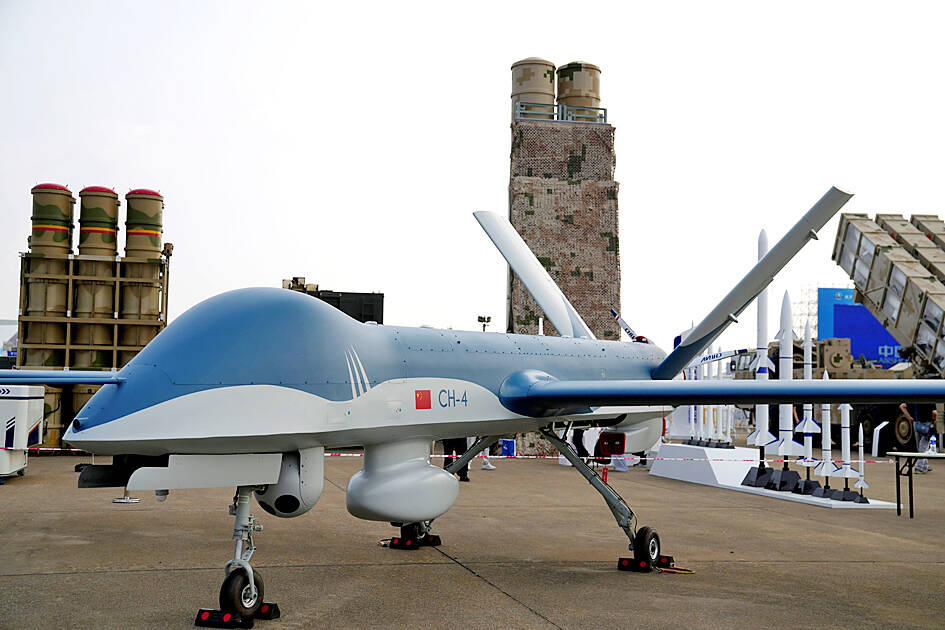Taiwan must develop ways to counter the rising threat posed by Chinese drones, the Institute for National Defense and Security Research wrote in a report commissioned by the Mainland Affairs Council.
The Chinese Communist Party (CCP) has increasingly used drones in the past few years to carry out “gray zone” operations in the airspace around Taiwan, and over the Taiwan Strait, the East China Sea and South China Sea, the report said.
Taiwan must develop measures to counter the drones, review whether existing weapons and equipment can be used to that end, and develop technologies, equipment and tactics that specifically deal with uncrewed aerial vehicles (UAVs).

Photo: Reuters
The military should also enhance and expand its use of drones, and develop advanced drone technology to bolster asymmetric combat capabilities, it wrote.
The Chinese UAVs that have been spotted in the region over the past few years include the CH-4 mixed attack and reconnaissance drone; the Harbin BZK-005 high-altitude, long-range drone; the Tengden TB-001 medium-altitude, long-endurance drone; the KVD-001 tactical drone; the BZK-007 reconnaissance drone; and the Wing Loong-10 high-altitude, long-endurance drone.
The latter three first appeared in the past year, the report said.
The Wing Loong-10 first appeared over the Taiwan Strait in April last year, flying northward, it said.
The vehicle, which uses a turbojet engine for propulsion, can be fitted with a variety of weapons systems to pinpoint targets before firing from high altitude, it said.
The BZK-007 first appeared in September last year over waters to the southeast of Taiwan, the report said.
The vehicle is equipped with a satellite antenna to perform long-term reconnaissance and surveillance tasks.
“This drone has the advantage that it is cheap to build, and it can stay in the air for up to 16 hours. It has become part of the regular arsenal of China’s air force,” the report said.
The report said that China was using the incursions into Taiwanese airspace to test its drones’ long-distance flight capabilities, satellite positioning, guidance, control and automatic route planning.
The incursions are also a way for China to test Taiwan’s and Japan’s air-defense response capabilities, it said.
However, China’s military drones are mainly tasked with patrols, surveillance, reconnaissance, target calibration, battlefield assessment, communications support, air-defense suppression and logistical support, it said.
“It is clear that the CCP will use a large number of drones in military and combat missions to support its various stages of combat operations,” the report said.
“This will mean everything from intelligence gathering and communications relay to the implementation of precision strikes and serving as decoys to consume enemy air defenses,” it said.
China might also convert older fighter jets, such as the J-6 and J-7 planes, into UAVs to serve as decoys, it said.

SECURITY: As China is ‘reshaping’ Hong Kong’s population, Taiwan must raise the eligibility threshold for applications from Hong Kongers, Chiu Chui-cheng said When Hong Kong and Macau citizens apply for residency in Taiwan, it would be under a new category that includes a “national security observation period,” Mainland Affairs Council (MAC) Minister Chiu Chui-cheng (邱垂正) said yesterday. President William Lai (賴清德) on March 13 announced 17 strategies to counter China’s aggression toward Taiwan, including incorporating national security considerations into the review process for residency applications from Hong Kong and Macau citizens. The situation in Hong Kong is constantly changing, Chiu said to media yesterday on the sidelines of the Taipei Technology Run hosted by the Taipei Neihu Technology Park Development Association. With

CARROT AND STICK: While unrelenting in its military threats, China attracted nearly 40,000 Taiwanese to over 400 business events last year Nearly 40,000 Taiwanese last year joined industry events in China, such as conferences and trade fairs, supported by the Chinese government, a study showed yesterday, as Beijing ramps up a charm offensive toward Taipei alongside military pressure. China has long taken a carrot-and-stick approach to Taiwan, threatening it with the prospect of military action while reaching out to those it believes are amenable to Beijing’s point of view. Taiwanese security officials are wary of what they see as Beijing’s influence campaigns to sway public opinion after Taipei and Beijing gradually resumed travel links halted by the COVID-19 pandemic, but the scale of

A US Marine Corps regiment equipped with Naval Strike Missiles (NSM) is set to participate in the upcoming Balikatan 25 exercise in the Luzon Strait, marking the system’s first-ever deployment in the Philippines. US and Philippine officials have separately confirmed that the Navy Marine Expeditionary Ship Interdiction System (NMESIS) — the mobile launch platform for the Naval Strike Missile — would take part in the joint exercise. The missiles are being deployed to “a strategic first island chain chokepoint” in the waters between Taiwan proper and the Philippines, US-based Naval News reported. “The Luzon Strait and Bashi Channel represent a critical access

Pope Francis is be laid to rest on Saturday after lying in state for three days in St Peter’s Basilica, where the faithful are expected to flock to pay their respects to history’s first Latin American pontiff. The cardinals met yesterday in the Vatican’s synod hall to chart the next steps before a conclave begins to choose Francis’ successor, as condolences poured in from around the world. According to current norms, the conclave must begin between May 5 and 10. The cardinals set the funeral for Saturday at 10am in St Peter’s Square, to be celebrated by the dean of the College